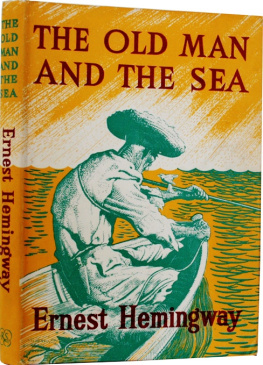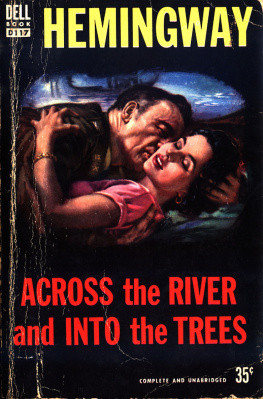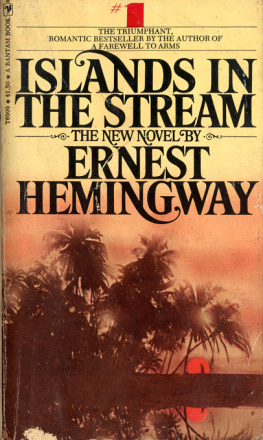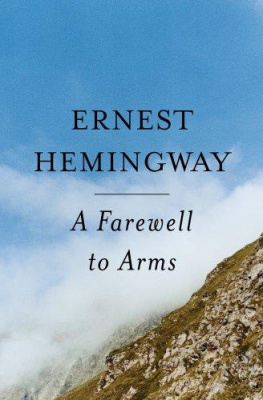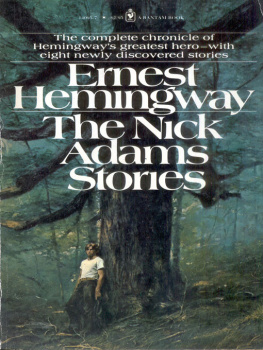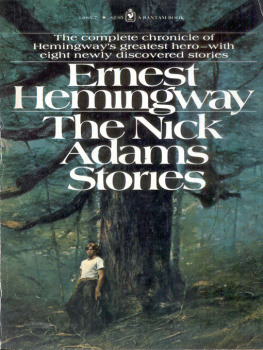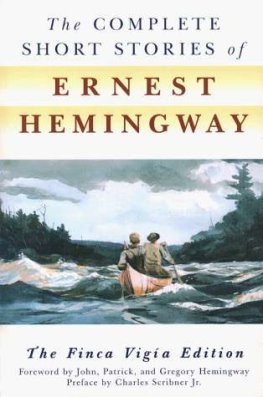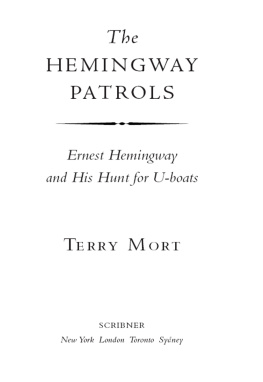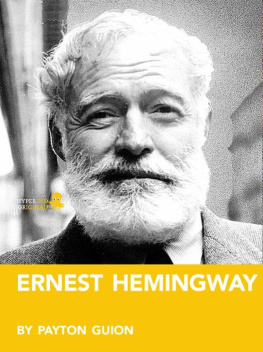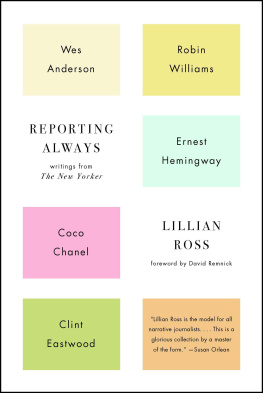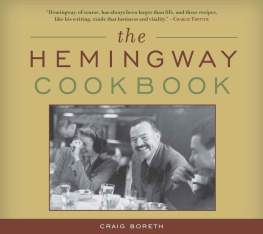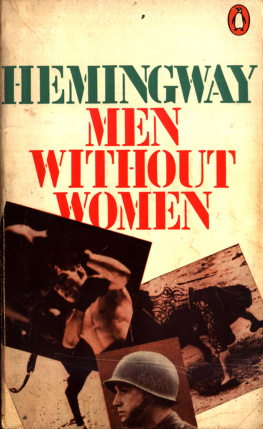Ernest Hemingway - The Old Man And The Sea
Here you can read online Ernest Hemingway - The Old Man And The Sea full text of the book (entire story) in english for free. Download pdf and epub, get meaning, cover and reviews about this ebook. genre: Adventure. Description of the work, (preface) as well as reviews are available. Best literature library LitArk.com created for fans of good reading and offers a wide selection of genres:
Romance novel
Science fiction
Adventure
Detective
Science
History
Home and family
Prose
Art
Politics
Computer
Non-fiction
Religion
Business
Children
Humor
Choose a favorite category and find really read worthwhile books. Enjoy immersion in the world of imagination, feel the emotions of the characters or learn something new for yourself, make an fascinating discovery.
- Book:The Old Man And The Sea
- Author:
- Genre:
- Rating:3 / 5
- Favourites:Add to favourites
- Your mark:
- 60
- 1
- 2
- 3
- 4
- 5
The Old Man And The Sea: summary, description and annotation
We offer to read an annotation, description, summary or preface (depends on what the author of the book "The Old Man And The Sea" wrote himself). If you haven't found the necessary information about the book — write in the comments, we will try to find it.
The Old Man And The Sea — read online for free the complete book (whole text) full work
Below is the text of the book, divided by pages. System saving the place of the last page read, allows you to conveniently read the book "The Old Man And The Sea" online for free, without having to search again every time where you left off. Put a bookmark, and you can go to the page where you finished reading at any time.
Font size:
Interval:
Bookmark:
Ernest Hemingway
To Charlie Shribner
And
To Max Perkins
He was an old man who fished alone in askiff in the Gulf Stream and he had gone eighty-four days now without taking afish. In the first forty days a boy had been with him. But after forty dayswithout a fish the boys parents had told him that the old man was nowdefinitely and finally salao, which is the worst form of unlucky, and the boy had gone at their orders in another boat which caught three goodfish the first week. It made the boy sad to see the old man come in each daywith his skiff empty and he always went down to help him carry either thecoiled lines or the gaff and harpoon and the sail that was furled around themast. The sail was patched with flour sacks and, furled, it looked like the flag of permanent defeat.
The old man was thin and gaunt with deepwrinkles in the back of his neck. The brown blotches of the benevolent skin cancer the sun brings from its reflection on the tropicsea were on his cheeks. The blotches ran well down the sides of his face andhis hands had the deep-creased scars from handling heavy fish on the cords. Butnone of these scars were fresh. They were as old as erosions in a fishlessdesert.
Everything about him was old except his eyesand they were the same color as the sea and were cheerful and undefeated.
Santiago, the boy said to him as theyclimbed the bank from where the skiff was hauled up. I could go with youagain. Weve made some money.
The old man had taught the boy to fish andthe boy loved him.
No, the old man said. Youre with a luckyboat. Stay with them.
But remember how you went eighty-seven dayswithout fish and then we caught big ones every day for three weeks.
I remember, the old man said. I know youdid not leave me because you doubted.
It was papa made me leave. I am a boy and Imust obey him.
I know, the old man said. It is quitenormal.
He hasnt much faith.
No, the old man said. But we have.Havent we?
Yes, the boy said. Can I offer you a beeron the Terrace and then well take the stuff home.
Why not? the old mansaid. Between fishermen.
They sat on the Terrace and many of thefishermen made fun of the old man and he was not angry. Others, of the olderfishermen, looked at him and were sad. But they did not show it and they spokepolitely about the current and the depths they had drifted their lines at andthe steady good weather and of what they had seen. The successful fishermen ofthat day were already in and had butchered their marlin out and carried themlaid full length across two planks, with two men staggering at the end of eachplank, to the fish house where they waited for the ice truck to carry them tothe market in Havana. Those who had caught sharks had taken them to the sharkfactory on the other side of the cove where they were hoisted on a block andtackle, their livers removed, their fins cut off and their hides skinned outand their flesh cut into strips for salting.
When the wind was in the east a smell cameacross the harbour from the shark factory; but today there was only the faintedge of the odour because the wind had backed into the north and then droppedoff and it was pleasant and sunny on the Terrace.
Santiago, the boy said.
Yes, the old man said. He was holding hisglass and thinking of many years ago.
Can I go out to get sardines for you fortomorrow?
No. Go and play baseball. I can still rowand Rogelio will throw the net.
I would like to go. If Icannot fish with you. I would like to serve in some way.
You bought me a beer, the old man said.You are already a man.
How old was I when you first took me in aboat?
Five and you nearly were killed when Ibrought the fish in too green and he nearly tore the boat to pieces. Can youremember?
I can remember the tail slapping andbanging and the thwart breaking and the noise of the clubbing. I can rememberyou throwing me into the bow where the wet coiled lines were and feeling thewhole boat shiver and the noise of you clubbing him like chopping a tree downand the sweet blood smell all over me.
Can you really remember that or did I justtell it to you?
I remember everything from when we firstwent together.
The old man looked at him with hissun-burned, confident loving eyes.
If you were my boy Id take you out andgamble, he said. But you are your fathers and your mothers and you are in alucky boat.
May I get the sardines? I know where I canget four baits too.
I have mine leftfrom today. I put them in salt in the box.
Let me get four fresh ones.
One, the old man said. His hope and hisconfidence had never gone. But now they were freshening as when the breezerises.
Two, the boy said.
Two, the old man agreed. You didnt stealthem?
I would, the boy said. But I boughtthese.
Thank you, the old man said. He was toosimple to wonder when he had attained humility. But he knew he had attained itand he knew it was not disgraceful and it carried no loss of true pride.
Tomorrow is going to be a good day withthis current, he said.
Where are you going? the boy asked.
Far out to come in whenthe wind shifts. I want to be out before it is light.
Illtry to get him to work far out, the boy said. Then if you hook somethingtruly big we can come to your aid.
He does not like to work too far out.
No, the boy said. But I will seesomething that he cannot see such as a bird working and get him to come outafter dolphin.
Are his eyes that bad?
He is almost blind.
It is strange, the old man said. He neverwent turtle-ing. That is what kills the eyes.
But you went turtle-ing for years off theMosquito Coast and your eyes are good.
I am a strange old man
But are you strong enough now for a trulybig fish?
I think so. And there are many tricks.
Let us take the stuff home, the boy said.So I can get the cast net and go after the sardines.
They picked up the gear from the boat. Theold man carried the mast on his shoulder and the boy carried the wooden boatwith the coiled, hard-braided brown lines, the gaff and the harpoon with itsshaft. The box with the baits was under the stern of the skiff along with theclub that was used to subdue the big fish when they were brought alongside. Noone would steal from the old man but it was better to take the sail and theheavy lines home as the dew was bad for them and, though he was quite sure nolocal people would steal from him, the old man thought that a gaff and aharpoon were needless temptations to leave in a boat.
They walked up the road together to the oldmans shack and went in through its open door. The old man leaned the mast withits wrapped sail against the wall and the boy put the box and the other gearbeside it. The mast was nearly as long as the one room of the shack. The shackwas made of the tough budshields of the royal palm which are called guano andin it there was a bed, a table, one chair, and a place on the dirt floor tocook with charcoal. On the brown walls of the flattened, overlapping leaves ofthe sturdy fibered guano there was a picture in color of the Sacred Heart ofJesus and another of the Virgin of Cobre. These were relics of his wife. Oncethere had been a tinted photograph of his wife on the wall but he had taken itdown because it made him too lonely to see it and it was on the shelf in thecorner under his clean shirt.
What do you have to eat? the boy asked.
A pot of yellow rice withfish. Do you want some?
No. I will eat at home. Do you want me tomake the fire?
No. I will make it later on. Or I may eatthe rice cold.
May I take the cast net?
Of course.
There was no cast net and the boy rememberedwhen they had sold it. But they went through this fiction every day. There wasno pot of yellow rice and fish and the boy knew this too.
Font size:
Interval:
Bookmark:
Similar books «The Old Man And The Sea»
Look at similar books to The Old Man And The Sea. We have selected literature similar in name and meaning in the hope of providing readers with more options to find new, interesting, not yet read works.
Discussion, reviews of the book The Old Man And The Sea and just readers' own opinions. Leave your comments, write what you think about the work, its meaning or the main characters. Specify what exactly you liked and what you didn't like, and why you think so.

